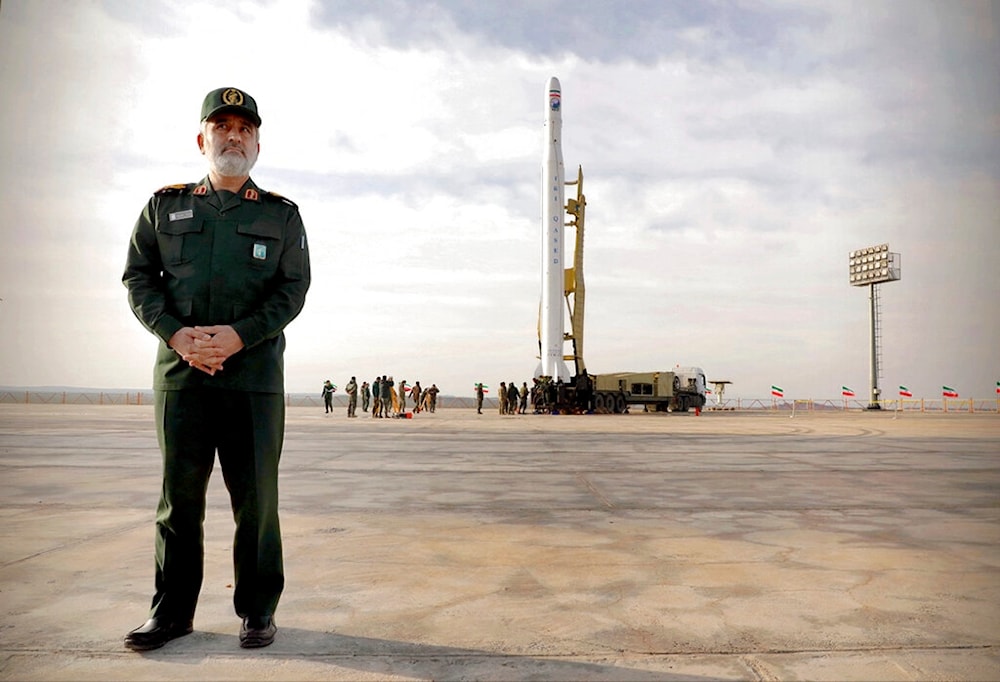IRGC says targeted Netzarim axis in Gaza during Op True Promise II
The commander of the IRGC's Aerospace Forces highlights that operations True Promise I and II were the largest missile strikes in the world, acknowledged even by the West.
-

In this photo released Wednesday, April 22, 2020, by Sepahnews, Gen. Amir Ali Hajizadeh, the head of the IRGC's aerospace division, stands in front of an Iranian rocket carrying a satellite in an undisclosed site. (Sepahnews via AP)
Operation True Promise III will inevitably take place, underlined Brigadier General Amir Ali Hajizadeh, the commander of the IRGC's Aerospace Forces, referring to Iran's retaliatory operation against "Israel".
"Just as True Promise I and II were fulfilled, True Promise III will definitely be fulfilled," Hajizadeh said, adding that "this is people's demand and we will not forget it."
He cautioned adversaries against targeting Iran’s nuclear facilities, stressing that they "must know what action we will take against them."
"A fire will break out in the region whose dimensions and scope cannot be calculated. For this reason, the enemies absolutely do not want such a thing," the commander warned, adding that Iran’s adversaries do not dare to launch an attack against the country.
Hajizadeh underscored that Iran is not "vulnerable" in military terms, pointing out that in the field of drones, the country has moved beyond imitation—now, other countries are replicating Iranian designs and using them as a model.
Following Iran’s two retaliatory operations, Israeli warplanes, using US-controlled airspace over Iraq, launched strikes on Iranian military installations in Tehran, Khuzestan, and Ilam provinces on October 26.
Iran stated that its air defense systems successfully intercepted the attack, limiting the damage to radar sites. However, five people—including four army officers and one civilian—were killed.
In response to this latest Israeli aggression, Iran has vowed to proceed with Operation True Promise III.
'Israel' failed to disrupt Iran's missile production
In the same context, the general explained that "Israel's" goal in its October 2024 aggression against Iran was to disrupt the country's missile production for a year, but it failed to achieve its objective, as the production line continued without interruption due to Iran's preparedness for the attack and anticipation of their plans.
Hajizadeh reminded that True Promise I and II were carried out in response to "Israel's" miscalculations, including the attack on the Iranian consulate in Damascus, Syria.
He emphasized that these operations were "the largest missile strike in the world, acknowledged even by the West," revealing that in Operation True Promise II, the IRGC targeted the Netzarim axis in the Gaza Strip, where Israeli occupation forces were stationed.
According to the commander of the IRGC's Aerospace Forces, more than 75% of Iran's missiles hit their targets accurately, despite the presence of the largest air defense system in the occupied territories, US warships, fighter jets, and the region-wide radar network monitoring Iranian missiles.
Hajizadeh pointed out that Iran has proven its commitment to its red lines and responded directly, even though it was previously believed that Tehran would refrain from direct retaliation due to its policy of avoiding war.
Regarding missile capabilities, he revealed that the range of Iran's missiles has now reached 2,000 kilometers, with no technical obstacles to extending it further. "If we wanted to reveal a new missile city every week, we would not finish showcasing these cities within two years," he emphasized.
The general stressed that Iran's defense capabilities continue to grow, with the increasing power of its military forces unsettling and intimidating its enemies.
Elsewhere, Hajizadeh reassured the Iranian people, stating, "War will not happen because the enemies know the cost of such folly and will not dare to pursue it."
Read more: US intel: 'Israel' likely to strike Iran by midyear

 4 Min Read
4 Min Read








